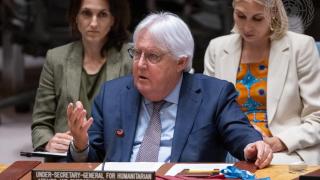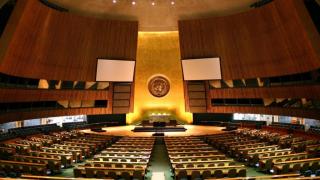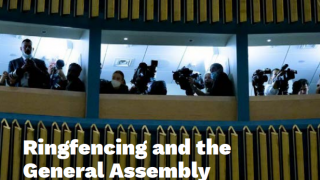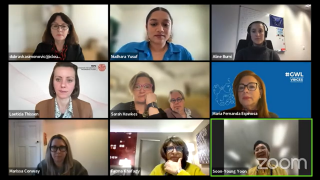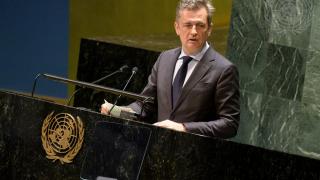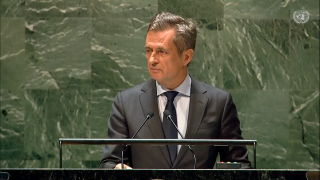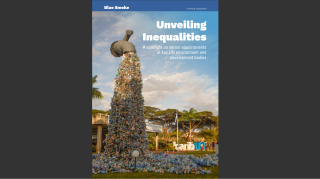
On Tuesday 28 November the Blue Smoke campaign published Unveiling Inequalities - a briefing examining senior appointments at key UN environment and development bodies.
This timely policy brief from Blue Smoke working group member Plataforma CIPÓ highlights the underrepresentation of Global South and women leaders in senior roles at the United Nations Development Programme (UNDP), United Nations Environment Programme (UNEP), the Food and Agriculture Organization (FAO), and the Convention On Biological Diversity (CBD).
The briefing makes the case for action that will make appointments more transparent, accountable, and ultimately, more representative of those most affected by climate and development issues. While the UN Charter commits to a truly independent international service, in reality, UN posts are too often politicised with monopolies by powerful states shutting out talent from across the world.
Despite reports of progress towards parity within the UN system, UNDP, UNEP, FAO, and the CBD continue to appoint overwhelmingly male leaders from the Global North. Across these four bodies, only 20% of senior leaders have been women and on average 40% have been from the Global South. This dynamic is especially troubling due to the disproportionate impact of climate change on people in the Global South, particularly women and girls. In order to address this and other global challenges, it is vital that the UN is led by senior leaders appointed through inclusive, merit-based and transparent appointment processes so that all qualified candidates, regardless of gender or nationality, are able to take part in shaping the climate and development policies that impact their communities.
The lack of transparency, accountability, meritocracy, civil society participation and representation compromises the UN and its entities’ credibility and ability to lead the global response to the climate emergency and to tackle the deep inequality that impacts vulnerable and disproportionately affected groups. Global South countries have historically been less represented in top UN appointments through this current system, which greatly impacts how solutions are presented, negotiated and implemented in their own territories.
To address this, the briefing presents the following recommendations:
- The United Nations entities should prioritise merit-based appointments to senior leadership positions. They should regularly review and strengthen their selection criteria and evaluation procedures for their senior positions, to ensure that the criteria align with the evolving challenges and demands of the respective fields.
- Diversity in leadership enhances decision-making, fosters innovation, and promotes inclusivity and democracy. Efforts should be made to achieve gender parity in senior leadership positions within the UN bodies.
- To enhance public trust and confidence, the UN bodies should establish mechanisms for accountability and transparency in senior leadership positions. This can be achieved, for instance, by publishing selection criteria, shortlists, and final appointments, allowing public scrutiny and feedback.
- Collaboration among UN bodies and other relevant international and regional organizations could contribute to more effective senior leadership appointments and must be carried out.
- The UN bodies should strengthen civil society participation. This includes involving NGOs, social movements, think tanks, and academia during campaign processes for the selection and evaluation of candidates for UN leadership roles.
Effective climate governance has never been more urgent. This year the world set alarming emissions and temperature records leading to extreme climate impacts across the globe. September 2023 was the hottest month in recorded history, with global average temperatures reaching 1.8°C above pre-industrial levels. According to the latest UN Emissions Gap Report, states’ current pledges under the Paris Agreement leave the world on track for a 2.5 - 2.9°C temperature rise. Without immediate action we will face catastrophic climate impacts. Already, we have seen unprecedented climate-induced disasters leaving millions in need of humanitarian support.
Blue Smoke is a working group created in 2022 to shine a light on elections and appointments to senior positions within the United Nations. The working group consists of UNA-UK, Plataforma CIPÓ and Strategy for Humanity and relies on the expertise of a wide network of experts, advisors and sources. We support multilateralism. We see the UN, for all its flaws, as the most legitimate body humanity has at present to bring states, civil society and other stakeholders together under the principles of the Organisation to stand up for human rights, sustainable development and peace.
Read more
- Learn more about Blue Smoke and subscribe to the newsletter
- Read the latest Blue Smoke newsletter
- Read the Blue Smoke report Ringfencing and the General Assembly
- Learn more about COP28
- Read the Plataforma CIPO report Enhancing civil society participation in international climate decision-making: perspectives from the Global South
Photo: Cover of the report: Unveiling Inequalities, A spotlight on senior appointments at key UN environment and development bodies. [Report image: a 30-foot high monument entitled ‘Turn off the plastics tap’ by Canadian activist and artist Benjamin von Wong outside the venue for the UN Environment Assembly. Credit: UNEP/Cyril Villemain.]

